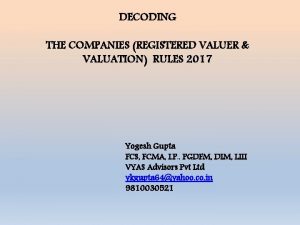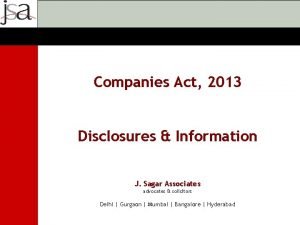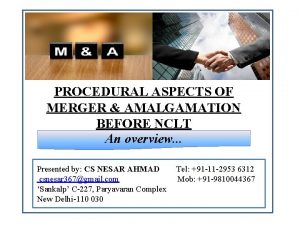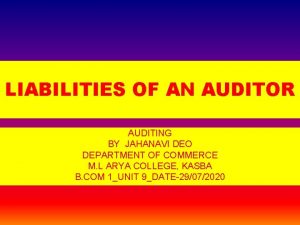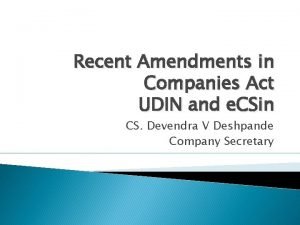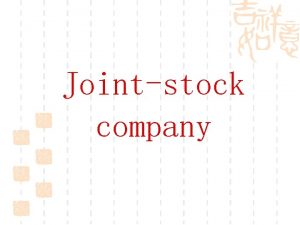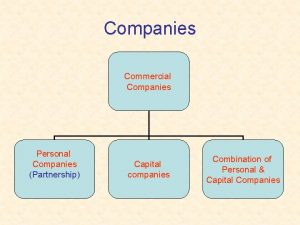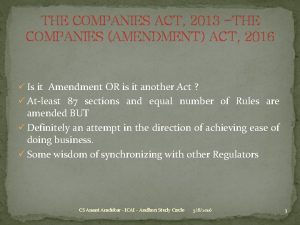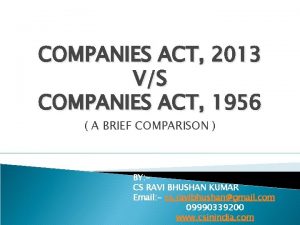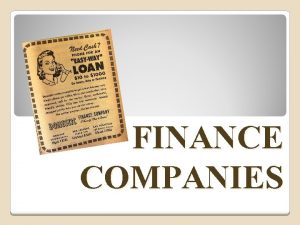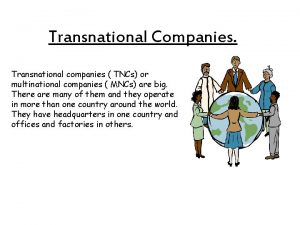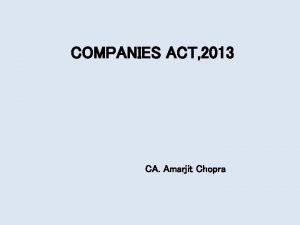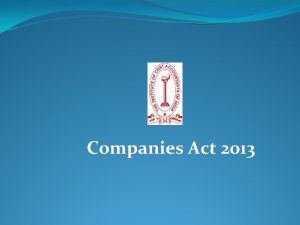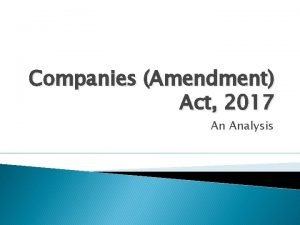COMPANY ACT 2013 COMPANY ACT 2013 The Companies











- Slides: 11

COMPANY ACT 2013

COMPANY ACT 2013 Ø The Companies Bill, 2011, introduced in Lok Sabha on 14 th December, 2011 was referred to the standing committee on 5 th January, 2012. The standing committee submitted its report on 26 th June, 2012. Incorporating recommendations of the Standing Committee, the companies Bill, 2012 was introduced and passed in Lok Sabha on 18 December 2012 and in the Rajya Sabha on 8 August 2013. After having obtained the assent of the President of India on 29 August 2013, it has now become the Companies Act, 2013.

Definitions Ø Legal Meaning: According to Companies Act “Company means a company formed under and registered under this Act or an existing company. An existing company means a company formed and registered under any of the previous Companies law”. Ø A group of persons associated together for the purpose of carrying on a business, with a view to earn profits. Ø New Definitions added in companies act, 2013 Ø One Person Company Ø Small Company Ø Dormant Company

Main Features of A Company. . . • • • Separate Legal Entity An Artificial Person But Not A Citizen Perpetual Succession Common Seal Separate Name Limited Liability Transferability of Shares Separate Property Number of Members Continued…

Main Features of A Company. . . 13) Raising of Capital On Large Scale 14) Capacity To Sue 15) Statutory Requirements

Features of a company Separate Legal Entity Ø The company is different and distinct from its members in the eye of law. It has its own name and its own seal, its assets and liabilities are separate and distinct from those of its members. It is capable of owning property, incurring debt, borrowing money, having a bank account, employing people, entering into contracts. Ø Ram sold his boots business to a newly formed company for Rs 33, 000. He took all 23, 000 shares of Rs 1 each and Rs 10, 000 debentures in the company. The debentures gave Ram a charge over the assets of the company. Subsequently when the company was wound up, its assets were found worth Rs 6, 000 and its liabilities amounted to Rs 17, 000 of which Rs 10, 000 were due to Ram (secured by debentures) and Rs 7, 000 due to unsecured creditors, the unsecured creditors claimed that Ram and the company were one and the same person, the company was a mere agent for Ram. Hence they should be paid in priority to Ram. Ø Ram, though virtually the holder of all the shares in the company, was also a secured creditor and was entitled to pay in priority to the unsecured creditors.

Features of a company Incorporated Association Ø A company comes into existence only after a certificate of incorporation has been obtained from the Registrar of Joint Stock Companies. Without incorporation, it has no legal existence. Artificial Legal Person Ø A company is an artificial person created by law to achieve the objectives for which it is formed. A company exists only in the contemplation of law. It is artificial person in the sense that it is created by a process other than natural birth and does not possess the physical attributes of a natural person. Ø It is invisible, intangible, immortal and exists only in the eyes of law. It has no body, no soul and no conscience; it is regarded as an artificial person.

Features of a company Limited Liability Ø The liability of the members of the company is limited to contribution to the assets of the company up to the face value of shares held by him. Ø A member is liable to pay only the uncalled money due on shares held by him when called upon to pay and nothing more, even if liabilities of the company far exceeds its assets. Perpetual Succession Ø A company does not die or cease to exist unless it is specifically wound up or the task for which it was formed has been completed. Membership of a company may keep on changing from time to time but that does not affect life of the company. Death or insolvency of member does not affect the existence of the company. Ø “Even where during war all the members of a company, while in general meeting was killed by a bomb, the company survived; not even a hydrogen bomb could have destroyed it”.

Features of a company Common Seal Ø A company being an artificial person cannot sign documents for itself whereas a natural person can do. The law has provided for the use of a common seal, with the name of the company engraved on it, as substitute for its signature. Ø The common seal of the company is approved in the first Board Meeting held immediately after the incorporation. Common seal has to be affixed on all important documents and contracts. Corporate Finance Ø A company generally raises large amount of funds in form of issuing shares, debentures, bonds and incurring loans and advances from financial institutions. The total share capital of a company is divided into a number of shares which are held by individual members and institutions.

Features of a company Diffused Ownership Ø Ownership of a company is in the hands of a large number of people. In case of Private Ltd. Company, the upper limit is up to 200. In case of a public Ltd. Company there is upper limit to the number of members. Separation of Ownership and Management Ø Share holders are the owners of the company. Company’s share holders are widely scattered. It is physically impossible for all of them to take patty in the management of the company. Being a share holder of a company does not give him the right to manage the affairs of a company. The management is vested with the directors, who are the legal representatives of the shareholders. Thus owners of the company have no direct control over the management of the company.

Features of a company Object clause of Business Ø A company can conduct only such business as stated in its first Memorandum of Association. In order to bring any charges in its activity, the object clause must be changed. Publication of Accounts Ø A joint stock company is required to file annual audited statements with the Registrar of Companies at the end of each financial year. The annual statements are available for inspection in the office of the Registrar.
 Appointment of registered valuer under companies act, 2013
Appointment of registered valuer under companies act, 2013 Website disclosures under companies act 2013
Website disclosures under companies act 2013 Section 230-240 of companies act 2013
Section 230-240 of companies act 2013 An auditor can be held liable under companies act 1949 for
An auditor can be held liable under companies act 1949 for Fiji companies act 2015
Fiji companies act 2015 Depreciation on air conditioner as per companies act
Depreciation on air conditioner as per companies act Section 11 company directors disqualification act
Section 11 company directors disqualification act Can backdated udin be generated
Can backdated udin be generated Importance of joint stock company
Importance of joint stock company Hình ảnh bộ gõ cơ thể búng tay
Hình ảnh bộ gõ cơ thể búng tay Frameset trong html5
Frameset trong html5 Bổ thể
Bổ thể
